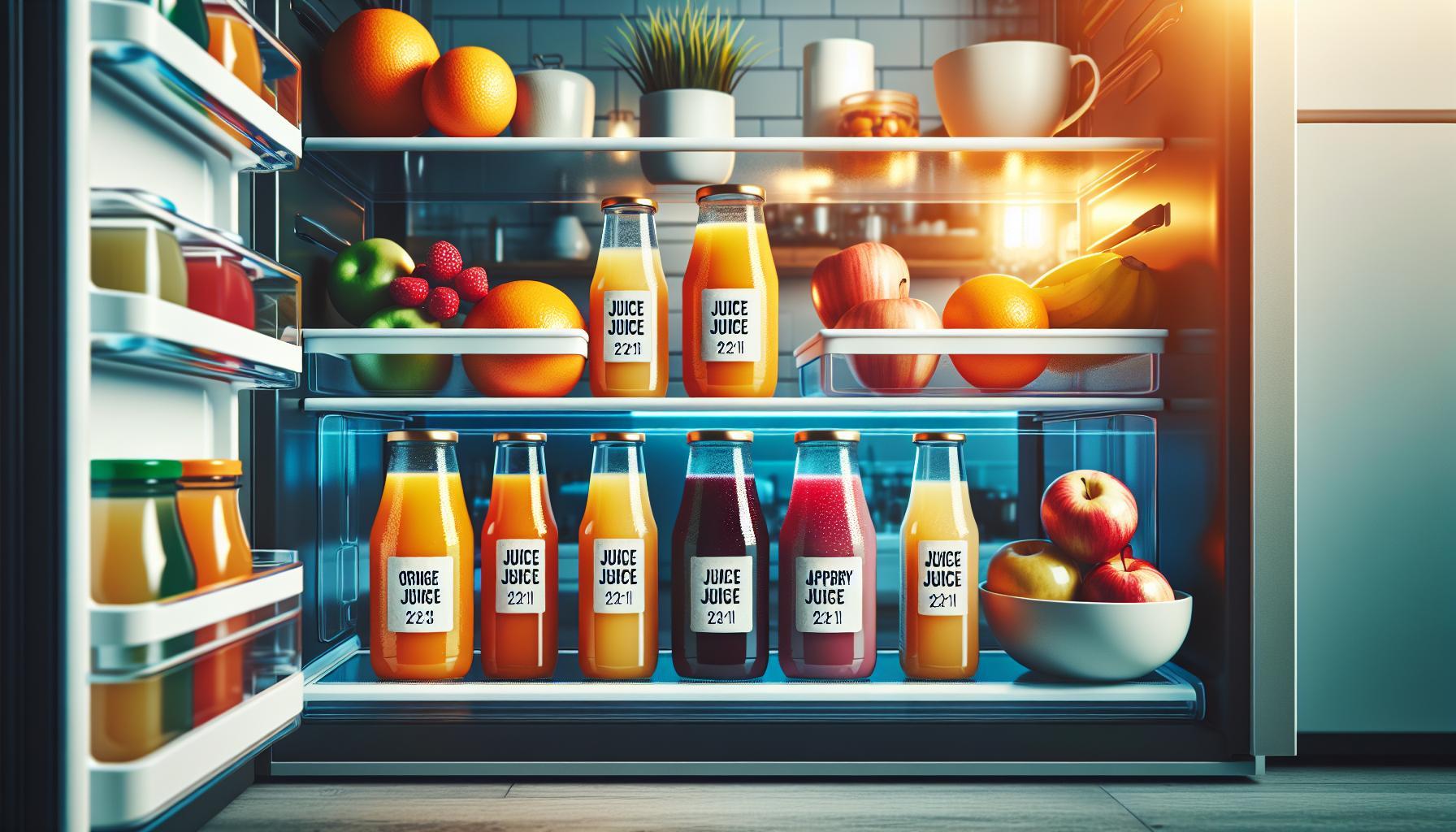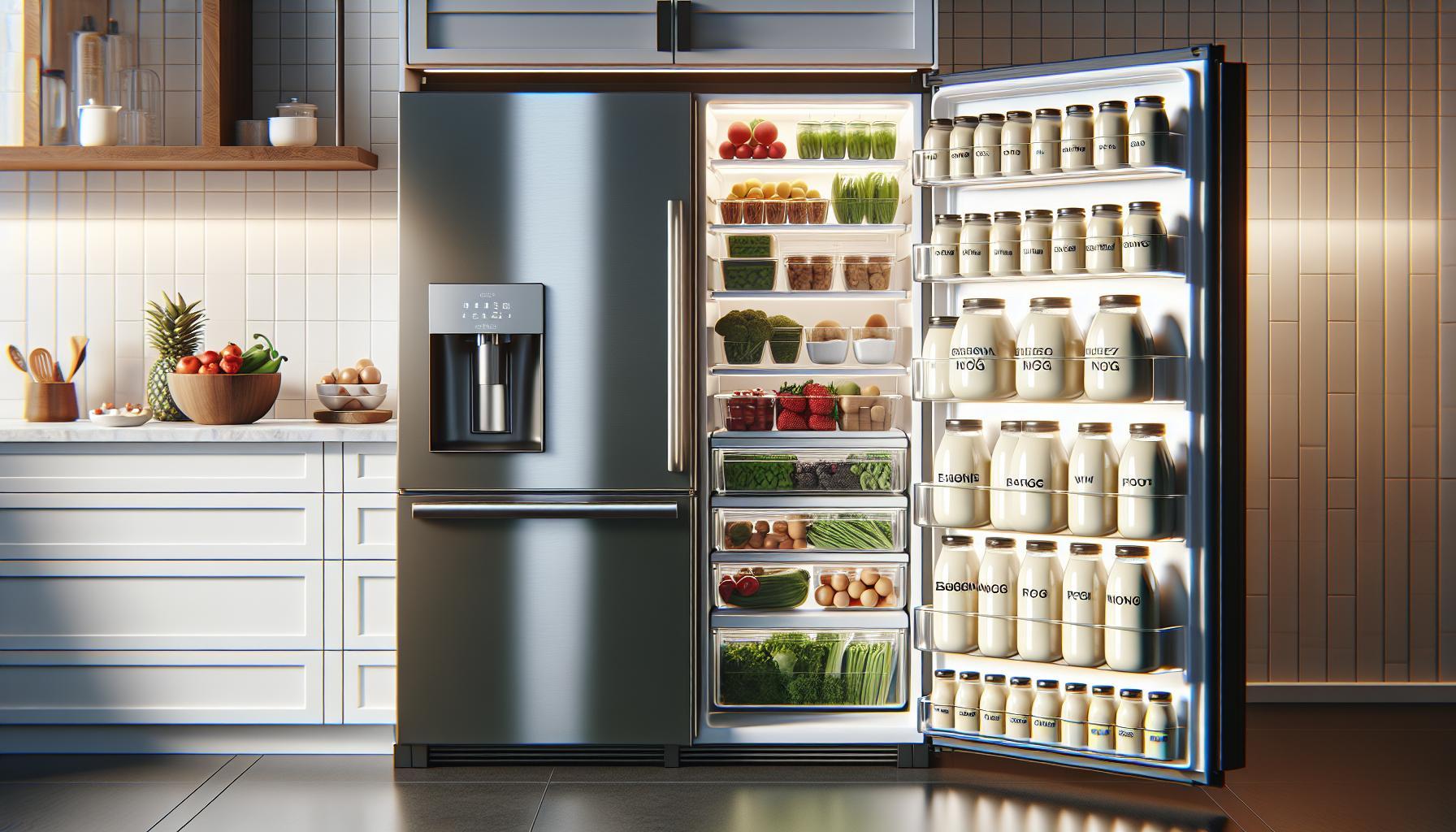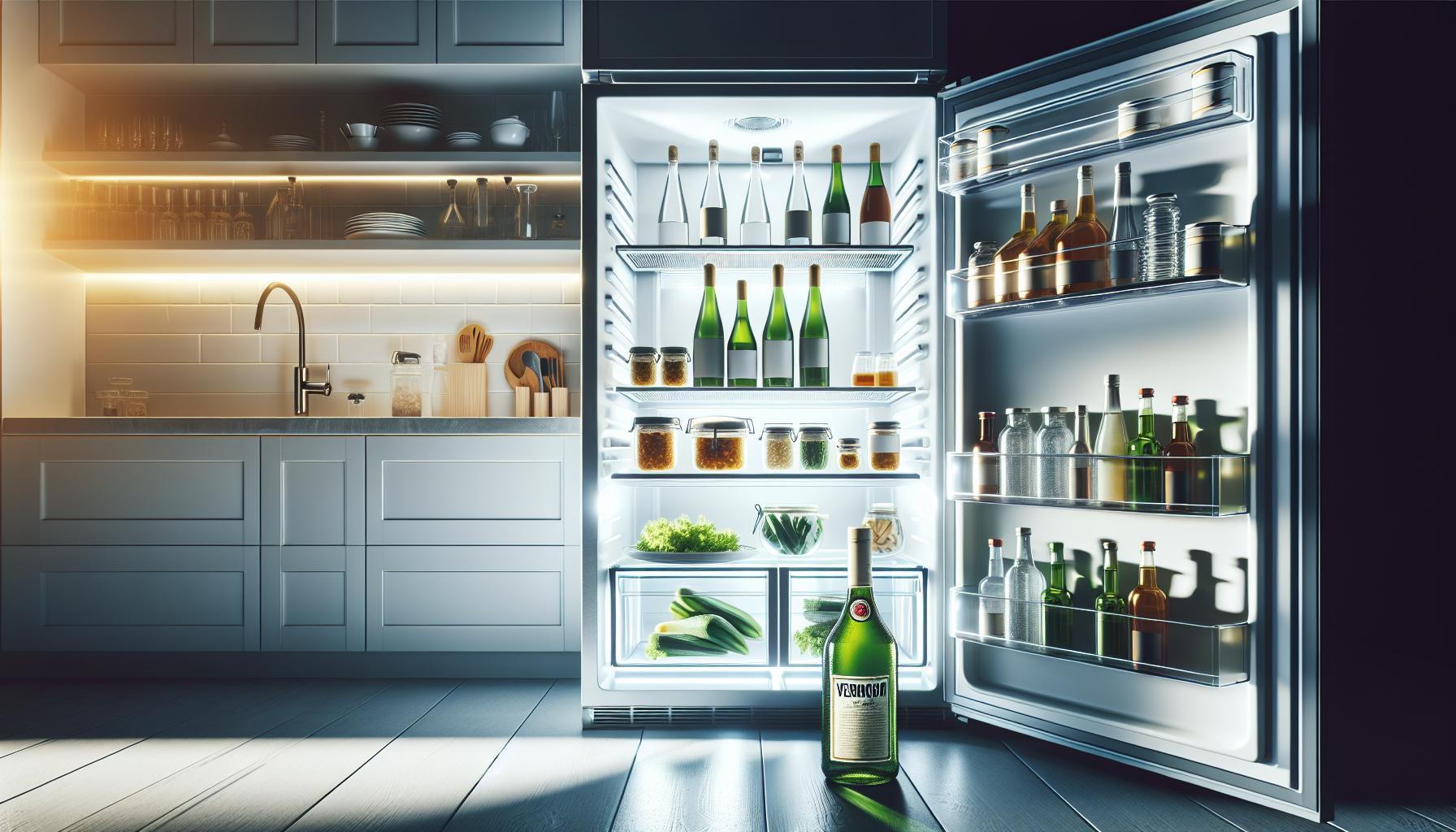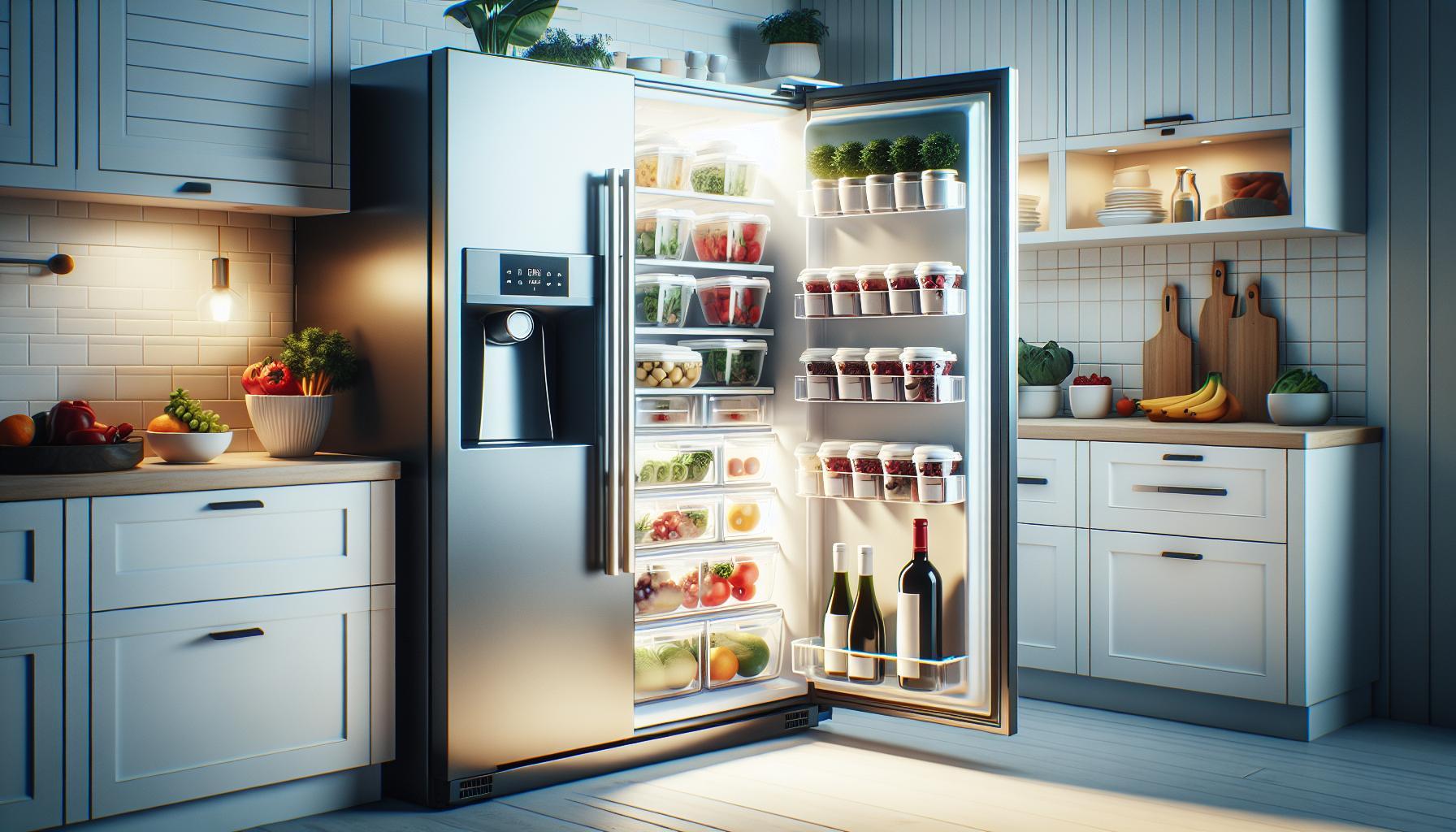Juice can be a refreshing addition to your diet, packed with vital nutrients and flavor. However, knowing how long your favorite juices last in the fridge is essential to ensure their freshness and safety. Proper storage is key to maintaining taste and preventing spoilage, which can help avoid waste and keep you healthy.
Are you tired of pouring out juice that has gone bad, or unsure how long to keep those bottles in your fridge? Understanding juice shelf life empowers you to make informed decisions about consumption and storage, ensuring that every sip is as delightful as the first.
In this article, we’ll explore the factors that affect juice longevity, practical storage tips, and timelines for various types of juices. Stay with us to unlock the secrets of keeping your juice fresher for longer, helping you enjoy every drop!
How Long Does Juice Last in the Fridge? Understanding Freshness
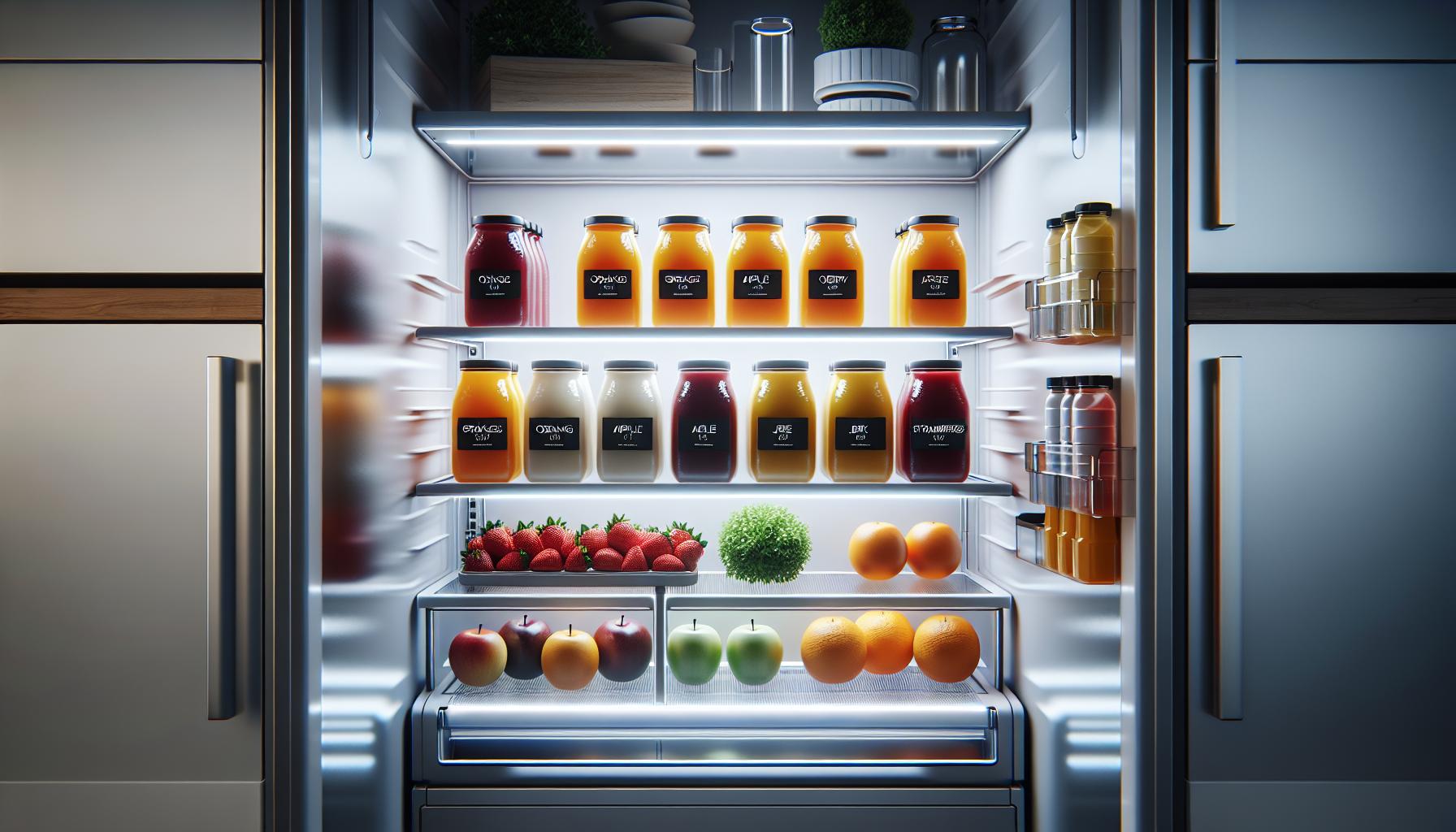
Juice is a refreshing and nutritious beverage that can brighten your day, but its freshness in the fridge isn’t indefinite. Generally, freshly squeezed juice can last 3 to 5 days in the refrigerator when stored properly. Commercially-produced juice, particularly those that are pasteurized, can last a bit longer, often 7 to 10 days past the expiration date on the label. However, be mindful that once opened, the clock starts ticking. To maximize the longevity of your juice, it’s essential to store it in an airtight container and keep it away from light and heat sources, as exposure can accelerate spoilage.
In terms of how freshness impacts flavor and nutritional content, it’s crucial to understand that juice starts losing some of its vital nutrients soon after extraction. Vitamin C, in particular, is highly sensitive to light and air, so consuming juice sooner rather than later is advisable for the best taste and health benefits. If you notice any separation in the juice or changes in its aroma, these could be signs that it’s past its prime, and it’s wise to err on the side of caution by discarding it.
By adhering to these guidelines, you can enjoy your juice at its freshest and most delicious. Always trust your senses-if it smells off or has an unusual taste, it’s best not to take any chances. Staying aware of these factors not only enhances your juice-drinking experience but also ensures you’re prioritizing food safety in your kitchen.
Types of Juice and Their Spoilage Rates
Juices come in various forms, each with different spoilage rates influenced by their ingredients and processing methods. When it comes to shelf life, understanding the type of juice you’re dealing with can significantly impact your consumption and storage practices. For example, freshly squeezed fruit juices like orange or apple juice generally last about 3 to 5 days in the refrigerator. On the other hand, juices made from harder vegetables, such as carrot juice, can often maintain their quality slightly longer, about 4 to 7 days when stored correctly.
Commercially produced juices undergo pasteurization, which extends their longevity. Most of these juices can last 7 to 10 days past the indicated expiration date, especially if unopened. However, once a carton is opened, it should be consumed within 3 to 5 days to ensure flavor and safety. It’s important to note that juices high in sugar, such as grape juice, might have a longer shelf life due to their lower pH levels that inhibit bacterial growth.
Common Types of Juice and Their Lifespans
| Type of Juice | Refrigerator Lifespan (Days) |
|---|---|
| Freshly Squeezed (e.g., Orange, Apple) | 3 – 5 |
| Vegetable Juice (e.g., Carrot) | 4 – 7 |
| Commercial Pasteurized Juice (Unopened) | 7 – 10 |
| Commercial Juice (Opened) | 3 – 5 |
To maximize freshness, it’s essential to pay attention to the juice’s composition. Fresh juices, rich in vitamin C, decline rapidly in nutritional value, particularly when exposed to oxygen and light. Therefore, if you have a juice that’s prone to spoilage, it’s wise to consume it sooner rather than later. Understanding these spoilage timelines can help ensure that your juice retains its taste and nutritional benefits, allowing you to enjoy it safely while preventing waste.
Signs Your Juice Has Gone Bad

When it comes to enjoying the refreshing benefits of juice, knowing when it has gone bad is crucial for both safety and taste. Spoilage can occur in various ways, and whether you’re sipping on freshly squeezed or store-bought varieties, there are key indicators to watch for. Mold growth is one of the most apparent signs; if you spot any fuzzy spots or unusual discoloration on the surface, it’s best to discard the juice immediately. Additionally, if the juice has separated in a way that doesn’t mix back together upon shaking, or if you detect an off smell, both could indicate spoilage.
Appearance changes should also raise a red flag. Fresh juice typically maintains a vibrant color; if your juice has dulled or taken on a strange hue, that could indicate that it’s no longer fresh. Another indicator is taste-if it has developed an unusual bitter or sour flavor, it may have begun to ferment or fermenting bacteria may be present. Always trust your senses; if something seems off, it’s safer to err on the side of caution and avoid consumption.
Lastly, consider the juice’s storage duration. Fresh juices generally last about 3 to 5 days when stored properly, whereas pasteurized juices may have a longer shelf life. If your juice has been sitting in the refrigerator longer than the suggested timeframe based on its type, it’s wise to carefully assess it for spoilage signs.
Practicing vigilance with these indicators will help ensure that your juice is both safe and enjoyable, allowing you to make the most out of every refreshing sip.
Best Practices for Storing Juice
Storing juice correctly can greatly extend its freshness and ensure that you enjoy its full flavor and nutritional benefits. To maintain the vibrant taste and quality of your juice, follow these essential practices:
- Choose the Right Container: Always store juice in airtight containers. Glass jars with tight-fitting lids or high-quality, BPA-free plastic bottles work best. Avoid using open containers or those that can allow air to enter, as this can accelerate spoilage.
- Keep It Cold: Juice should be stored in the refrigerator immediately after preparation or purchasing. The ideal temperature for juice storage is below 40°F (4°C). Ensure your fridge maintains consistent cooling to avoid temperature fluctuations.
- Label and Date: When storing homemade juice, label containers with the date of preparation. This practice helps you easily identify its age and ensures that you consume it within the safe timeframe, usually 3 to 5 days for fresh juice.
- Avoid Sunlight: Store juice in a dark area of the fridge or in opaque containers. Exposure to light can degrade the quality of juice over time and negatively impact its nutrients and flavor.
Additionally, if you don’t plan to consume your juice within a few days, consider freezing it. Juice can be poured into ice cube trays or larger containers designated for freezing, which can preserve its quality for up to several months. However, avoid freezing juice in glass containers, as they can crack. Always leave some space in the container for expansion.
By following these best practices, you’ll maximize the freshness and lifeline of your juice, ensuring you can enjoy it safely and deliciously.
Impact of Juice Ingredients on Shelf Life
The specific ingredients used in juice play a crucial role in determining how long it can last in the fridge. For instance, citrus juices like orange and lemon typically have a longer shelf life due to their high acidity, which acts as a natural preservative. On the other hand, juices made from vegetables or low-acid fruits, such as cucumber or melon, tend to spoil more quickly, often lasting only 2 to 3 days in the refrigerator. Understanding the varying influences of these components can greatly assist in managing juice freshness.
Freshly squeezed juices are at their peak quality when consumed shortly after preparation, often recommended within 24 to 72 hours, depending on the ingredients. The presence of additional components like herbs, spices, or sweeteners can alter this timeframe as well. For example, adding ginger or turmeric not only enhances flavor but can also help extend the juice’s freshness due to their antimicrobial properties. Conversely, juices blended with dairy or yogurt should be consumed within a day, as the potential for bacterial growth increases.
To optimize shelf life, it’s beneficial to consider the combinations of fruits and vegetables in your juice. Mixing high-sugar fruits (like apples and bananas) with fresh greens can yield a delicious blend while still maintaining good longevity, but this should ideally be consumed in a timely manner. Additionally, juices that contain pulp may have a shorter shelf life due to the higher moisture content, which facilitates spoilage.
Incorporating well-chosen ingredients can not only impact freshness but also enhance the overall health benefits of your juice. Prioritizing high-acid fruits and certain flavor-enhancers provides both taste and longevity, ensuring that your juice not only lasts longer but also retains its full nutritional value during storage.
How to Extend the Freshness of Juice
To savor the vibrant taste and nutritional benefits of your freshly pressed juice for as long as possible, employing a few strategic techniques can significantly extend its freshness. One of the most effective methods is to minimize its exposure to air. Oxygen accelerates the oxidation process, which can lead to spoilage. To combat this, consider using airtight glass containers to store your juice. These containers not only help maintain flavor and nutrients but also prevent the growth of bacteria.
Another great tip is to keep your juice refrigerated immediately after preparation. Ideally, store it in the coldest part of your fridge rather than the door, where temperatures are less stable due to frequent opening. Consuming your juice within 24 to 72 hours is best, but following these steps can help stretch that window. If you find yourself with an abundance of juice, freezing it might be a smart option. Pour your juice into ice cube trays, freeze, and then transfer the cubes to a freezer bag for long-term storage, where they can last up to six months.
Incorporating ingredients with natural preservative qualities can also enhance freshness. For instance, citrus fruits like lemon or lime can both boost flavor and act as a natural barrier against deterioration due to their acidic nature. Additionally, adding a pinch of salt can help preserve freshness; however, be mindful of your overall sodium intake. Lastly, always check for signs of spoilage, such as off odors or changes in color, to ensure your juice remains safe and enjoyable to consume. By utilizing these practical methods, you can keep your juice delicious and nutrient-rich for a longer duration.
Homemade vs. Store-Bought Juice Lifespan
Juicing enthusiasts often find themselves at a crossroads when deciding between homemade and store-bought options. Each type of juice has its pros and cons regarding freshness and shelf life, which can significantly affect your selection. Homemade juices, prepared from fresh, whole fruits and vegetables, generally have a much shorter lifespan due to the lack of preservatives. Typically, homemade juice can last about 24 to 72 hours in the fridge when stored correctly. To maximize freshness, it’s essential to use airtight containers and keep the juice in the coldest part of the refrigerator.
On the other hand, store-bought juices often undergo pasteurization, which helps extend their shelf life significantly-sometimes up to several weeks or even months. This process kills harmful bacteria and delays spoilage, making them a convenient choice for busy lifestyles. However, this convenience comes at a nutritional cost: pasteurization can break down some of the vitamins and enzymes, reducing the juice’s overall health benefits. Additionally, many store-bought juices contain added sugars, artificial flavors, and preservatives, which detract from their wholesomeness.
To navigate the complexities of juice freshness, consider the intended use. If you’re looking for the vibrant taste and maximal nutritional benefits, homemade juice is the way to go-but consume it quickly. For convenience and longevity, store-bought options are a practical choice, especially for those who may not have the time or resources to juice at home regularly. It’s crucial, however, to read labels carefully and choose high-quality products that prioritize natural ingredients.
In summary, the lifespan of juice dramatically varies between homemade and store-bought types. Understanding the differences not only helps in making informed decisions but also ensures that you enjoy your juice at its peak freshness and nutritional value.
Freezing Juice: A Comprehensive Guide
Freezing juice can be a game-changer when it comes to extending its shelf life, enabling you to enjoy nutritious beverages long after they’ve been prepared. With the right techniques, you can preserve the flavor, nutrients, and freshness of your juice, making it a convenient choice for those busy mornings or afternoons when you need a quick healthy boost. Here’s how to effectively freeze your juice and keep it at its best.
To begin, ensure that your juice is 100% fresh with no additives or preservatives. Homemade juice tends to freeze better without compromising taste and quality. After preparing your juice, allow it to cool to room temperature before freezing. The best containers for freezing juice include airtight glass jars, freezer-safe plastic containers, or freezer bags. When using bags, be sure to leave an inch of space at the top for expansion.
Freezing Guidelines
- Storage Duration: Fresh juice can be frozen for up to 6 months without significant loss of flavor or nutrients. However, for optimal taste, consume it within 3 months.
- Serving Size: Consider freezing juice in individual portions, such as ice cubes or small containers, so you can thaw only what you need.
- Labeling: Don’t forget to label your containers with the date of freezing and the type of juice for easy identification later.
When you’re ready to enjoy your frozen juice, transfer it to the refrigerator to thaw overnight, or you can thaw it under cool running water if you need it sooner. Avoid using the microwave for thawing as it can alter the texture and nutrients.
Additionally, the freezing process may change the texture of some juices, particularly those with pulp. If you prefer a smoother consistency after thawing, consider straining the juice again before serving. By following these guidelines, you can ensure that your juice remains a delicious and nutritious option even weeks after its initial preparation.
Juice Storage Containers: What to Use
When it comes to preserving the freshness of your juice, the choice of storage container is crucial. Using the right container can make a significant difference in maintaining the flavor, nutrients, and overall quality of juice. Opt for containers that are specifically designed for food storage to ensure optimal conditions. Glass jars with tight-fitting lids are excellent for this purpose; they are non-reactive, help in preventing oxidation, and are easy to clean. Furthermore, dark glass can also protect juice from light, which can degrade its quality over time.
Plastic containers are another viable option, particularly those labeled as BPA-free. Look for containers with airtight seals, as this will minimize air exposure and help keep your juice fresh for longer. While you may find plastic more convenient due to its lightweight nature and variety of sizes, be mindful that some plastics can retain odors and flavors, especially if you frequently store different types of juices.
For short-term storage, you can also use reusable silicone bags, which take up less space in the fridge and are easy to seal tightly. These bags are excellent for freezing juices as well because they can expand to accommodate varying amounts of liquid. However, be sure to leave some space at the top of whatever container you choose, as juice can expand when frozen.
A quick summary of recommended containers for juice storage:
- Glass Jars: Ideal for short-term refrigeration; best for preventing oxidation.
- BPA-Free Plastic Containers: Lightweight and convenient, but ensure they have airtight seals.
- Silicone Bags: Versatile for both refrigeration and freezing, with space-saving qualities.
Following these guidelines will help you choose the right container to keep your juice fresh, allowing you to enjoy its health benefits without compromising on quality.
Effect of Pasteurization on Juice Longevity
The impact of pasteurization on juice longevity is significant and cannot be overlooked when considering the shelf life of your favorite beverages. Pasteurization is the process of heating juice to a specific temperature for a set amount of time to kill harmful bacteria and extend its shelf life. This process not only makes juice safer to consume but also affects its freshness and nutritional quality. For instance, pasteurized juice can last much longer in the refrigerator-typically around one to two weeks-compared to fresh, unpasteurized juice, which should ideally be consumed within three to five days.
When juice is pasteurized, there is a noticeable change in its flavor profile and nutrient content. While pasteurization helps in preventing spoilage and extending shelf life, it can lead to the loss of some sensitive vitamins-particularly vitamin C and certain B vitamins-due to the high heat involved. This means that while you may enjoy the convenience of longer-lasting juice, you might be sacrificing some of the nutritional benefits that come from fresh, raw juice. Therefore, if nutrient density is a priority for you, consider consuming freshly made juice when possible and utilize pasteurized options for longer storage needs.
For those who prefer fresh juices, knowing that they have a shorter shelf life emphasizes the importance of proper storage. Ensure that homemade juice is kept in airtight containers and refrigerated immediately after preparation. Always check for signs of spoilage, such as off odors or changes in color and texture, before consumption.
In summary, pasteurization is an effective method for prolonging the shelf life of juice, making it safe for longer durations. However, this convenience comes with trade-offs in flavor and nutritional value, prompting consumers to weigh their options based on personal health goals and preferences.
Nutritional Changes Over Time in Refrigerated Juice
Juice can be a refreshing and nutritious addition to your diet, but it’s essential to understand how its nutritional content can change over time, especially once it’s stored in the refrigerator. From the moment juice is extracted, its delicate vitamins and minerals start to degrade due to exposure to air, light, and temperature fluctuations. For instance, freshly made juice may contain high levels of vitamin C and other nutrients, but these levels can diminish significantly after just a few days of refrigeration.
Key Nutritional Changes
As juice sits in the fridge, certain nutrients become less stable. Generally, sensitive vitamins like vitamin C can decrease by approximately 30-50% within the first few days of storage. Similarly, B vitamins may also decline, affecting the juice’s overall health benefits. In contrast, some nutrients, such as fiber and certain minerals, remain stable, which is why homemade juices made from whole fruits and vegetables still retain some of their health advantages even as other nutrients fade.
Storage Temperature Matters
The refrigerator’s temperature plays a crucial role in how quickly juice loses its nutritional value. Keeping your juice at a consistent above 40°F (4°C) can help slow down the deterioration process. To maximize freshness, store juice in an airtight container-preferably glass, as it reduces exposure to light and air compared to plastic. Pouring the juice to fill the container as much as possible minimizes air space, which also helps retain nutrients.
How Long Can You Expect Freshness?
For optimal taste and nutrition, it’s advisable to consume freshly made juice within 24 to 72 hours of preparation. Beyond this window, while it may still be safe to drink for a few additional days, the nutritional quality will diminish considerably. Always trust your senses; if the juice develops an off smell, changes in color, or sediment at the bottom, it’s best to err on the side of caution and refrain from consumption.
By being mindful of how juice’s nutritional content changes over time and adhering to proper storage practices, you can enjoy your juice while maximizing its health benefits.
Tips for Safely Consuming Expired Juice
Even the most health-conscious consumers often find themselves with juice that has exceeded its recommended shelf life. Understanding how to safely approach expired juice can reduce waste and prevent potential health risks. While it’s advisable to consume freshly made juices within 24 to 72 hours, here are some practical tips on what to do if you find yourself with a bottle that’s past this timeframe.
Start by assessing the appearance and aroma of the juice. Fresh juice should be vibrant in color and have a pleasant, fruity smell. If the juice appears cloudy, has separated significantly, or emits an off-putting odor, it’s better to discard it. Even if the juice looks and smells okay, perform a quick taste test: take a small sip. If the flavor has turned sour or off, it’s best to err on the side of caution and dispose of it.
If the juice is merely a few days past its prime but shows no signs of spoilage, ensure it has been stored correctly. Keeping juice in an airtight glass container in the refrigerator can help maintain its freshness and mitigate the growth of bacteria. However, consuming juice that’s been opened and stored beyond its recommended timeframe-particularly if it’s nearing a week or more-carries a higher risk of foodborne illness.
Additionally, always consider the type of juice in question. Some juices, like those that have been pasteurized, may have longer shelf lives due to reduced microbial loads compared to raw juices. Even so, they are not immune to spoilage. Remember to adhere to general food safety guidelines such as the “when in doubt, throw it out” principle. Ultimately, the key to determining whether to consume expired juice lies in your senses: sight, smell, and taste. By using these techniques, you can better navigate juice expiration and enjoy your beverages safely.
Q&A
Q: How can I tell if juice is still good to drink?
A: To determine if juice is still good, check for a sour smell, off-taste, or unusual color. If there are floating particles or significant sediment, it’s best to discard it. Always trust your senses, and when in doubt, throw it out.
Q: How long can I freeze juice for maximum freshness?
A: Juice can be frozen for about 6 to 8 months without significantly losing its taste or nutritional value. Use airtight containers to prevent freezer burn and ensure quality upon thawing. For more details, refer to the “Freezing Juice: A Comprehensive Guide” section of our article.
Q: Does juice go bad if it’s past the expiration date?
A: Juice may still be safe to consume shortly after the expiration date, but it can lose flavor and nutrients. Check for signs of spoilage, such as changes in smell or appearance. Always err on the side of caution regarding safety.
Q: Can I store juice in plastic bottles?
A: Yes, you can store juice in plastic bottles; ensure they are food-safe. However, for longer shelf life, glass or BPA-free containers are preferred to preserve flavor and prevent leaching. For optimal storage practices, see the “Best Practices for Storing Juice” section.
Q: What is the best way to extend the shelf life of homemade juice?
A: To extend the shelf life of homemade juice, store it in airtight containers in the refrigerator and consume it within 3 to 5 days. Adding lemon juice can help preserve freshness. For more tips, check the “How to Extend the Freshness of Juice” section.
Q: How long does pasteurized juice last compared to fresh juice?
A: Pasteurized juice can last 2 to 3 weeks in the fridge due to the heat treatment that kills bacteria. In contrast, fresh juice typically lasts 3 to 5 days. For more details, refer to “Effect of Pasteurization on Juice Longevity.”
Q: Is it safe to consume juice that’s slightly carbonated?
A: Slight carbonation in juice can indicate fermentation, which can lead to spoilage. If juice is fizzy without carbonation being added, it’s best to discard it to avoid potential health risks.
Q: How should I store juice to maintain its nutritional value?
A: Store juice in a cool, dark place, preferably in the refrigerator at or below 40°F (4°C). Use airtight containers to minimize exposure to air, which can degrade its nutritional value. For more storage tips, see the “Juice Storage Containers: What to Use” section.
Concluding Remarks
Now that you know how long juice lasts in the fridge, it’s time to put your newfound knowledge to good use! Always remember that freshness is key for both flavor and nutrition, so check your juice regularly and store it properly to maximize its shelf life. If you’re curious about juice storage tips or want to explore the benefits of homemade juices, be sure to check out our detailed guides on preserving juice quality and the nutritional advantages of fresh ingredients.
Don’t forget to subscribe to our newsletter for more insights on food storage strategies and healthy eating tips! Your health journey can start here-share your thoughts in the comments below or explore related articles for more practical tips and tricks that make living a vibrant life easier. Stay refreshed and informed, and make the most of every sip!

